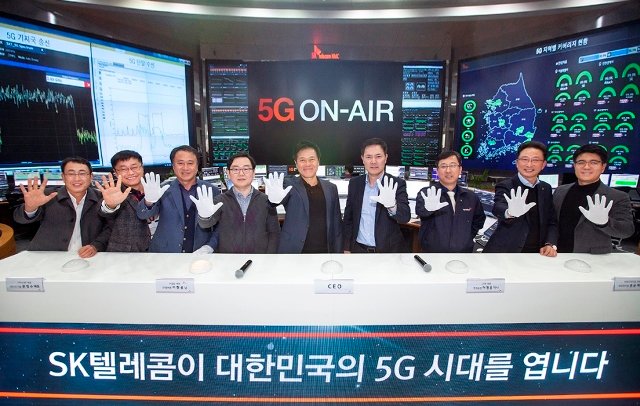SK Telecom on Saturday announced that it has switched on its 5G network on December 1, 2018.
 SK Telecom’s 5G network currently covers main areas of 13 cities and counties nationwide, including Seoul, four cities in Gyeonggi-do (Seongnam, An-san, Hwaseong, Siheung), six metropolitan cities, Seogwipo in Jeju Island, and Ullengdo and Dokdo Islands in Ulleng county.
SK Telecom’s 5G network currently covers main areas of 13 cities and counties nationwide, including Seoul, four cities in Gyeonggi-do (Seongnam, An-san, Hwaseong, Siheung), six metropolitan cities, Seogwipo in Jeju Island, and Ullengdo and Dokdo Islands in Ulleng county.
The largest telecom operator in Korea did not reveal its 5G tariffs for residential and business customers.
SK Telecom CEO Park Jung-ho located in Bundang, Gyeonggi-do made the first call over SK Telecom’s commercial 5G network to SK Telecom Manager Park Sook-hee located in Myeongdong, Seoul.
The company has also completed 5G calls from Bundang to Haeundae (Busan), Dunsandong (Daejeon) and Geumnam-ro (Gwangju). SK Telecom engineers used Samsung’s 5G smartphone prototype for the 5G calls.
Myunghwa Industry, SK Telecom’s first 5G enterprise customer, began operating the 5G-AI Machine Vision solution today. Myunghwa, an auto parts company based in Banwol Industrial Complex, Ansan, Gyeonggi-do, will use the 5G solution to verify product quality.
SK Telecom’s 5G network will assist Myunghwa Industry to take multi-angle photos of auto parts on the conveyor belts using 12 million-pixel cameras and transmit to the cloud server over 5G network and AI in the server instantly scans the photos to check for defects.
SK Telecom conducted test-driving of 5G self-driving cars on public roads in Siheung as well as test tracks of K-City, a test site for autonomous vehicles located in Hwaseong, Gyeongg-do. These cars use SK Telecom’s 5G network exchange surrounding information with the control center and traffic lights, dozens of times per second.
SK Telecom, which has 22.87 million LTE subscribers and annual revenue of KRW 17.520 trillion, plans to boost the 5G-AI ecosystem. SK Telecom plans to open 5G Device Test Lab this month at its Bundang office building to support small and medium-sized device manufacturers.
KT Group, the main rival of SK Telecom, in September said it will make an investment of 23 trillion won or $20.4 billion over the next five years in 5G and other innovative technologies.
The company, which launched the world’s first 5G trial services at the PyeongChang Winter Olympic Games in February, recently unveiled the 5G Open Lab at its Research and Development (R&D) center in Seoul.
The 5G Open Lab has attracted partners, including Samsung, Hyundai Mobis, Posco, Intel, Ericsson and Nvidia. KT plans to forge 1,000 partnerships by 2020. It has signed agreements with Intel and Qualcomm to cooperate in preparing commercial 5G services.
